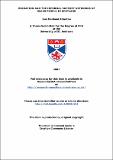Files in this item
Migration and the informal support networks of older people in Scotland
Item metadata
| dc.contributor.advisor | Graham, Elspeth | |
| dc.contributor.advisor | Flowerdew, Robin | |
| dc.contributor.author | Atherton, Iain Maitland | |
| dc.coverage.spatial | viii, 312 p. | en |
| dc.date.accessioned | 2007-02-08T16:41:02Z | |
| dc.date.available | 2007-02-08T16:41:02Z | |
| dc.date.issued | 2007 | |
| dc.identifier.uri | https://hdl.handle.net/10023/161 | |
| dc.description.abstract | This thesis investigates the effects of national patterns of migration on informal support for older adults in contemporary Scotland. It argues that geography matters, and develops a multi-scale conceptual framework to analyse the relationships among population mobility, contrasting local contexts in which older people live, and care and support from the intergenerational family and the community. 130 older persons from three locales with different migration patterns are recruited to the study and a mixed-method approach is adopted, using data from the census, a questionnaire survey and a set of in-depth interviews with both older people and formal service providers. The findings demonstrate significant differences between the three study locales in terms of the geography of the intergenerational family and the extent and nature of informal support received. Daughters provide more support than sons, suggesting the continuation of traditional gender norms. Local community is important, especially in the rural locale, but friends and neighbours are not providing a substitute for adult children living at a distance. It appears that non-kin respond to need where physical health is compromised but not where the older person suffers from depression. This raises serious questions about the future of family support in an increasingly mobile society with declining fertility and growing numbers of adult daughters in full-time employment. The relationships demonstrated confirm and extend many previous findings, but the discussion concludes that there are some grounds for optimism. The intergenerational family remains important to its members who can and do overcome geographical separation at times of crisis. Further, slowly changing gender norms, combined with contemporary demographic trends, may effect changes in the pattern of intergenerational support, which will, to some extent, offset the worsening older-age dependency ratios predicted for Scotland and other European countries over the next few decades. | en |
| dc.format.extent | 3424502 bytes | |
| dc.format.mimetype | application/pdf | |
| dc.language.iso | en | en |
| dc.publisher | University of St Andrews | |
| dc.rights | Creative Commons Attribution-NonCommercial-NoDerivs 2.5 Generic | |
| dc.rights.uri | http://creativecommons.org/licenses/by-nc-nd/2.5/ | |
| dc.subject | Older people | en |
| dc.subject | Migration | en |
| dc.subject | Informal care and support | en |
| dc.subject | Family | en |
| dc.subject | Community | en |
| dc.subject.lcc | HQ1064.G7A8 | |
| dc.subject.lcsh | Older people--Social networks--Scotland | en |
| dc.subject.lcsh | Older people--Family relationships--Scotland | en |
| dc.subject.lcsh | Older people--Care--Scotland | en |
| dc.subject.lcsh | Population geography | en |
| dc.title | Migration and the informal support networks of older people in Scotland | en |
| dc.type | Thesis | en |
| dc.type.qualificationlevel | Doctoral | en |
| dc.type.qualificationname | PhD Doctor of Philosophy | en |
| dc.publisher.institution | The University of St Andrews | en |
This item appears in the following Collection(s)
Except where otherwise noted within the work, this item's licence for re-use is described as Creative Commons Attribution-NonCommercial-NoDerivs 2.5 Generic
Items in the St Andrews Research Repository are protected by copyright, with all rights reserved, unless otherwise indicated.


